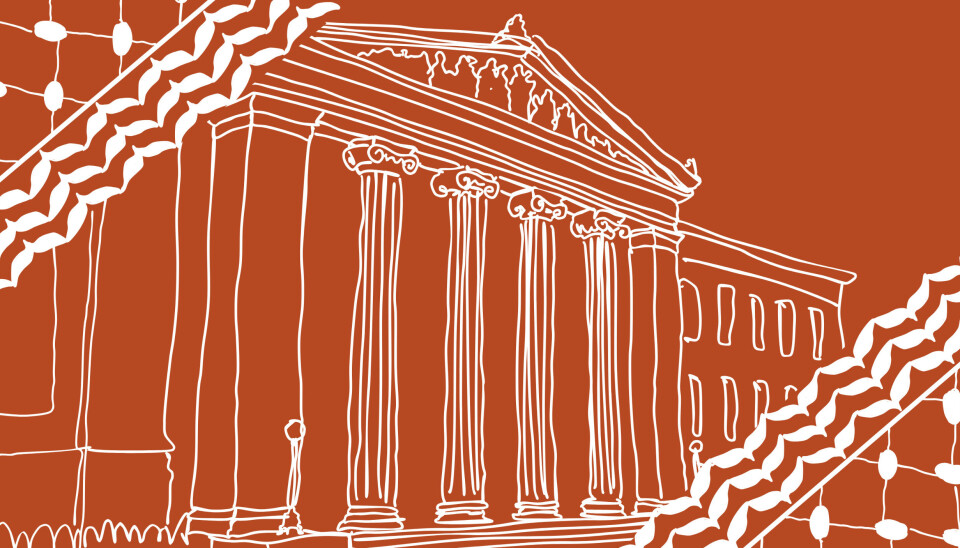
If International Law Has Failed Palestinians, Why Keep Studying It?
International law is being pushed to its limits in the fight against genocide and impunity. Academia is stepping up, offering crucial insights into the ongoing struggle for justice for Palestinians — and not the least, hope.

On February 10 at Blindern, Francesca Albanese, UN Special Rapporteur on the Occupied Palestinian Territories, spoke with Greta Thunberg to a packed auditorium about the role of international law in Palestine.
— Devastation [in Gaza] should have been prevented. That’s what international law is here for, she said.
With growing inequality, discrimination, genocide, impunity, and a looming climate crisis, it is easy to question the relevance of international law. Why should we continue investing time in studying a field which experts like Albanese describe as being tragically slow and ineffective at addressing acts of genocide instead of calling for a global revolution on the streets? Universitas consulted two scholars for their opinion.
International Law and the Palestinian Genocide
— The organised international community failed to take adequate measures to prevent genocide in Gaza. States could and should have done more, says Gentian Zyberi, head of the Norwegian Centre for Human Rights at UiO, adding:
— All states need to go beyond formal condemnations and into sanctioning Israeli authorities for their wrongful actions in Gaza and the continued illegal occupation of Palestinian territory.
Despite its painfully obvious shortcomings, according to both Albanese and Zyberi, international law has been increasingly used to protect the human rights of Palestinians through an ongoing process of accountability.
— The two permanent international courts, the International Court of Justice (ICJ) and the International Criminal Court (ICC), have been seized with addressing the situation in Gaza and more widely in the occupied Palestinian territory.
The ICJ has decided on several cases on Palestine, and more are pending. The ICC on its part has approved arrest warrants for war crimes and crimes against humanity. Furthermore, even though states may struggle to enforce international law, Albanese highlights how NGOs and civil society groups may use legal tools to challenge state actions.

Academia and activism
Although Albanese maintained that she does not feel like an activist but rather an academic, Zyberi argues that the separation between academia and activism is overly simplistic, noting the intersection between the two, especially when violations of international law occur.
— I don't think that scholars are necessarily activists or need to be activists, but they need to speak up when there are clearly serious violations being committed, he says.
The organised international community failed to take adequate measures to prevent genocide in Gaza. States could and should have done more.
Gentian Zyberi
Zyberi also pointed to the growing role of students in advocating for justice:
— Students have been at the forefront of condemning mass atrocity crimes in Gaza within the campuses in the US and across Europe. I am proud of our UiO students for their mobilisation.
This activism is reflected in the increased interest for international legal studies at UiO and the rise in applications for its competitive master's programs in various areas of international law.
The curiosity students have shown for this field does not come without debates surrounding decades-long questions on the effectiveness of international law. Ole Kristian Fauchald, head of the department of Public and International Law at UiO, has noticed a clear divide among students, with some questioning the efficacy of the international legal system, while others remaining hopeful about its potential to address global challenges.
Zyberi embraces this critical spirit of students:
— I like it, actually, when they are critical and they ask the difficult questions.
In this environment of robust academic discussion, students’ thirst for knowledge and activism represent a strong engagement with the difficult questions surrounding international law and its role in a rapidly changing world.
Hope for the future of international law

Though slow and not without its limitations, international law remains crucial as it is not only about enforcement, but also about influencing domestic political discussions, says Fauchald.
Given today’s global and complex challenges, he believes that the relevance of international law cannot be overstated.
— We are all legally based societies in the world. There are laws everywhere. It’s almost unthinkable that you will be able to create a society that is not based on norms. We cannot take away all laws and start living happily in an anarchic society. Some people believe that we can, but I’m not among them, he says.
Zyberi is also hopeful that the field of international law will continue to retain its importance.
—Despite the situation at the moment where it seems that international law and human rights enjoy very little currency, a professional career is long, and a good knowledge of human rights and international law can open many doors and opportunities at the national, regional, and international level, he adds.
Finally, Albanese addressed students' concerns about the perceived limitations of international law in protecting Palestinians.
— Standing for justice is priceless, she emphasises.
Drawing on history, she reminded the audience that human rights movements have played a crucial role in addressing numerous atrocities in the past.
— We have to at least try, she concluded, urging continued efforts for change.
































